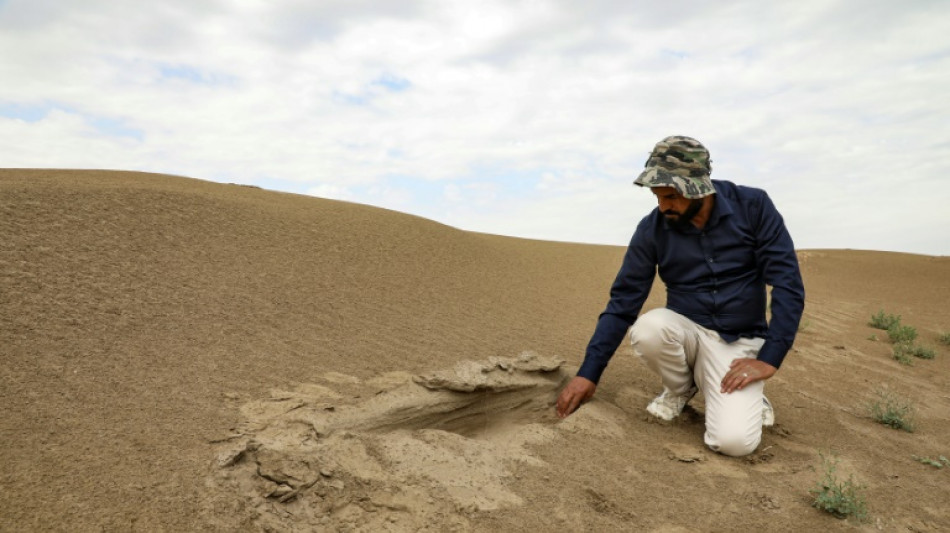
-
 Under-fire Gatland 'motivated' to continue as Wales coach
Under-fire Gatland 'motivated' to continue as Wales coach
-
South Africa send Wales crashing to 87-year low in Test rout

-
 Spurs condemn Man City to fifth straight defeat as Arsenal win
Spurs condemn Man City to fifth straight defeat as Arsenal win
-
Defeated Leipzig lose more ground on Bayern, Frankfurt go second

-
 South Africa put Wales to the sword to wrap up season
South Africa put Wales to the sword to wrap up season
-
Spurs thrash Man City 4-0 to end 52-match unbeaten home run

-
 Defeated Leipzig lose more ground on Bayern
Defeated Leipzig lose more ground on Bayern
-
Venezuela opposition calls for 'enormous' anti-Maduro protest

-
 Inter take Serie A lead as AC Milan and Juve bore in stalemate
Inter take Serie A lead as AC Milan and Juve bore in stalemate
-
England captain George wary of Jones's influence on Japan

-
 Thousands demand lower rents at Barcelona demo
Thousands demand lower rents at Barcelona demo
-
'Puzzle' master Sinner powers champions Italy back into Davis Cup final

-
 Odegaard inspires Arsenal to reignite title hopes
Odegaard inspires Arsenal to reignite title hopes
-
Marseille down Lens to stay in touch with Ligue 1 leaders

-
 Novak Djokovic: All-conquering, divisive tennis superstar
Novak Djokovic: All-conquering, divisive tennis superstar
-
Scott Bessent a credible, safe pick for Treasury: experts

-
 World approves UN rules for carbon trading between nations at COP29
World approves UN rules for carbon trading between nations at COP29
-
Putin signs law letting Ukraine fighters write off bad debts

-
 Thousands march against Angola govt
Thousands march against Angola govt
-
Ireland coast to victory as they run Fiji ragged

-
 Atletico make comeback to beat Alaves as Simeone hits milestone
Atletico make comeback to beat Alaves as Simeone hits milestone
-
Aid only 'delaying deaths' as Sudan counts down to famine: agency chief

-
 Leipzig lose more ground on Bayern with Hoffenheim loss
Leipzig lose more ground on Bayern with Hoffenheim loss
-
Arsenal back to winning ways, Chelsea up to third in Premier League

-
 Sinner powers Davis Cup holders Italy past Australia to final
Sinner powers Davis Cup holders Italy past Australia to final
-
Andy Murray to coach Novak Djokovic

-
 Leipzig lose ground on Bayern, Dortmund and Leverkusen win
Leipzig lose ground on Bayern, Dortmund and Leverkusen win
-
Fear in central Beirut district hit by Israeli strikes

-
 Chinese film about Covid-19 wins Taiwan's top Golden Horse prizes
Chinese film about Covid-19 wins Taiwan's top Golden Horse prizes
-
Tuipulotu puts anger behind him as he captains Scotland against native Australia

-
 Inter smash Verona to take Serie A lead
Inter smash Verona to take Serie A lead
-
Mass rape trial sparks demonstrations across France

-
 Lebanon says 15 killed in Israeli strike on central Beirut
Lebanon says 15 killed in Israeli strike on central Beirut
-
Eddie Jones will revel in winding up England - Genge

-
 Chelsea see off Leicester on Maresca's King Power return
Chelsea see off Leicester on Maresca's King Power return
-
Storms bring chaos to Ireland, France, UK

-
 Berrettini gives Italy edge on Australia in Davis Cup semis
Berrettini gives Italy edge on Australia in Davis Cup semis
-
Amber Glenn storms to gold in Cup of China

-
 High-flying Chelsea see off Leicester
High-flying Chelsea see off Leicester
-
Climate-threatened nations stage protest at COP29 over contentious deal

-
 Families fleeing after 32 killed in new sectarian violence in Pakistan
Families fleeing after 32 killed in new sectarian violence in Pakistan
-
Ancelotti says 'ugly' to speculate about Mbappe mental health

-
 Failure haunts UN environment conferences
Failure haunts UN environment conferences
-
Colapinto in doubt for Las Vegas GP after crashing

-
 Lebanon says 11 killed in Israeli strike on central Beirut
Lebanon says 11 killed in Israeli strike on central Beirut
-
Three arrested in Spain for racist abuse at Liga Clasico

-
 Pope to skip Notre Dame opening for Corsica visit
Pope to skip Notre Dame opening for Corsica visit
-
Tokyo police care for lost umbrellas, keys, flying squirrels

-
 Neuville closes in on world title after Rally Japan recovery
Neuville closes in on world title after Rally Japan recovery
-
Jaiswal slams unbeaten 90 as India seize control against Australia


Iraq's ancient treasures sand-blasted by climate change
Iraqi archaeological marvels that have survived millennia and the ravages of war now face a modern threat: being blasted and slowly buried by sandstorms linked to climate change.
Ancient Babylonian treasures, painstakingly unearthed, are slowly disappearing again under wind-blown sand in a land parched by rising heat and prolonged droughts.
Iraq, one of the countries worst-hit by climate change, endured a dozen major sandstorms last year that turned the sky orange, brought daily life to a halt and left its people gasping for air.
When the storms clear, layers of fine sand cover everything -- including the Sumerian ruins of Umm al-Aqarib, "the Mother of Scorpions", in the southern desert province of Dhi Qar.
Sandstorms have slowly begun to reverse years of work there to unearth the temples' terracotta facades and many priceless artifacts, said archaeologist Aqeel al-Mansrawi.
Archaeologists in Iraq have always had to shovel sand, but now the volumes are growing.
After a decade of worsening storms, sand at Umm al-Aqarib now "covers a good part of the site", that dates back to around 2350 BC and spans more than five square kilometres, he said.
In the past, the biggest threat was looting of antiquities at the ruins, where pottery fragments and clay tablets bearing ancient cuneiform script have been discovered.
Now the changing weather and its impact on the land, especially creeping desertification, spell an additional threat to ancient sites all across southern Iraq, said Mansrawi.
"In the next 10 years," he said, "it is estimated that sand could have covered 80 to 90 percent of the archaeological sites."
- 'Weathering and disintegration' -
The fabled land between the Tigris and Euphrates rivers hosted some of the world's earliest civilisations, the remains of which are under threat in modern-day Iraq.
The oil-rich country is still recovering from decades of dictatorship, war and insurgency and remains plagued by misrule, corruption and widespread poverty.
Compounding its woes, Iraq is also one of the five countries most impacted by some effects of climate change, including drought, says the United Nations.
Upstream dams in Turkey and Iraq have reduced the flow of its big rivers, and more water is wasted by Iraq's ancient irrigation system and outdated farming practices.
Summer temperatures topping 50 degrees Celsius (122 degrees Fahrenheit) now often batter Iraq where droughts have parched agricultural areas, driving farmers and pastoralists into crowded cities.
"The sandstorms became more frequent, the wind became dustier and the temperatures increase," said Jaafar al-Jotheri, professor of archaeology at Iraq's Al Qadisiyah University.
"The soil has become more fragile and fragmented because of the lack of vegetation and roots," he explained.
As more farmers flee the countryside, "their land is left behind and abandoned and its soil becomes more exposed to the wind".
Winds pick up "more sediment fragments that reach the archaeological sites", Jotheri said, adding that the "sand and silt cause physical weathering and disintegration of buildings".
- 'Containing the sand dunes' -
The problem is compounded by salinisation, said Mark Altaweel, professor of Near East Archaeology at University College London.
During extreme heat, he explained, water on the land surface evaporates so quickly that the soil does not reabsorb the crystals, which are left behind as a crust.
"When it's hyper dry, the water quickly evaporates and that leaves that salt residue," he said, adding that "you can see it on the bricks".
Jotheri said that salt in the earth carried by sandstorms causes "chemical weathering for archaeological buildings".
Iraqi authorities insist they are tackling the complex and multi-layered problem.
The government "is working to contain the sand dunes", said Chamel Ibrahim, director of antiquities of Dhi Qar province.
He pointed to a plan to plant a "green belt" of trees at a cost of about $3.8 million.
But Jotheri voiced doubt, saying that to keep the vegetation alive, "you need a lot of water".
When it comes to climate change, he said, "we are the country facing the most and acting the least. We are at the bottom of the list in terms of acting against climate change."
F.Müller--BTB

